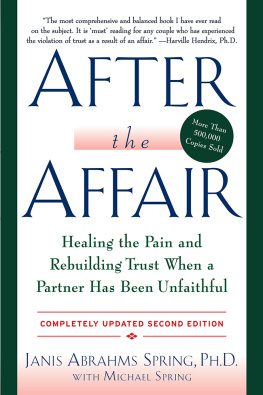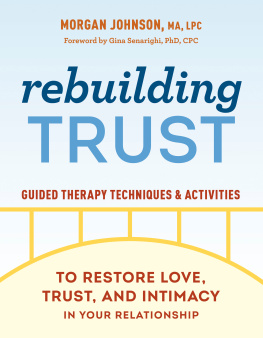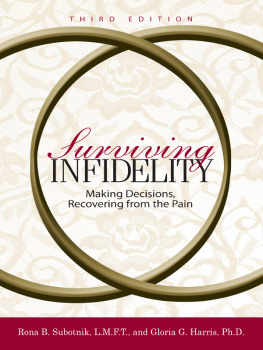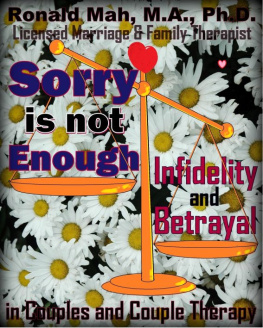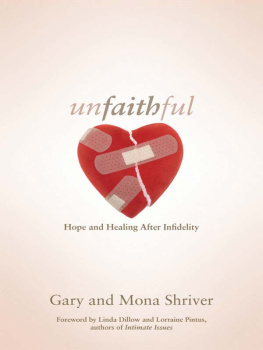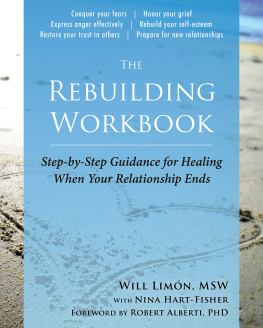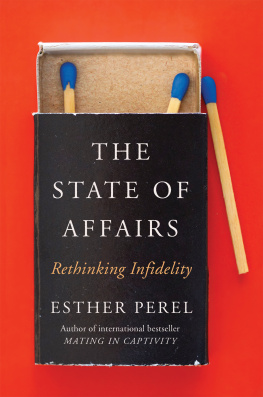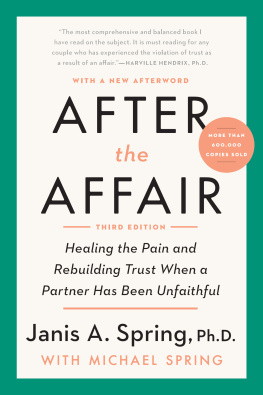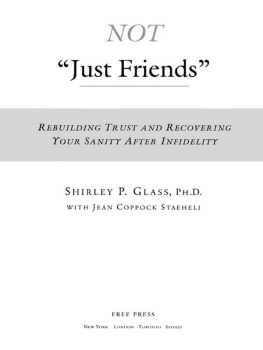AFTER
THE
AFFAIR
Healing the Pain
and Rebuilding Trust
When a Partner Has
Been Unfaithful
Completely Updated Second Edition
J ANIS A BRAHMS S PRING , P H .D.
WITH M ICHAEL S PRING

To my best buddies, Aaron, Max, and Michael
CONTENTS
Can a Couple Survive Infidelity?
As a clinical psychologist who has been treating distressed couples for thirty-five years, I answer yesprovided that each of you is willing to look honestly at yourself and at your partner, and acquire the skills you need to see yourself through this shattering crisis.
It may help to remind yourself that youre not alone. Statistics vary widely, but according to one of the most recent and reputable studies, as many as 37 percent of married men and 20 percent of married women have been unfaithful.
WHAT CONSTITUTES AN AFFAIR?
Must an affair be coital? What about a kiss? What about lunch?
I dont try to answer these questions because, in the end, what matters is what matters to you. A breach of trust depends entirely on what you agreed toor thought you agreed to. Virtually all of you would feel betrayed by a partner who had intercourse with a third person, whether during a one-night stand or as part of a long-term emotional entanglement. But many of you would also feel betrayed, and certainly threatened, by other intimate behaviorsa hug, say, or the sending of a dozen white roses. Five years ago a patient of mine named Sharon took her blouse off and showed her breasts to her best friends husband. They never went further, but the two couples have been struggling with this violation ever since.
In this second edition, Ive added a chapter on the new infidelity: the electronic or e-affair. will help you determine what constitutes an affair in cyberspace and give you the tools you need to negotiate your differences.
THREE JUDGMENTS I DONT MAKE
1. I dont make blanket judgments about whether affairs are, in themselves, good or bad. What may be enhancing for one of you may devastate the other, and destroy the relationship. I have found, however, that a continuing affair, without the consent of both partners, perpetuates the dysfunction in a relationship and makes the forging of an intimate attachment virtually impossible. If youre an unfaithful partner who is serious about reconnecting, you must, I believe, give up your lover.
2. I dont separate the two of you into victim and victimizer, betrayed and betrayer. Each of you must accept an appropriate share of responsibility for what went wrong. Rather than assign blame, I encourage each of you to confront those parts of yourself that led to the affair, and to change in ways that rebuild trust and intimacy. That doesnt mean I hold you equally accountable for the affairno one can make another person stray. But I do ask you both to be accountable for whatever space you created that made room for another person to come between you.
3. I dont suggest that you should stay together no matter what, or bolt just because you feel unhappy. Instead, I invite each of you to explore with me your unique reasons for having or giving up a lover, for choosing or refusing to recommit. Your decision should be deliberate and well-considered, not based on feelings alone. Your feelings, in fact, may betray you.
A WORD ABOUT THE CHOICE OF TERMS
Throughout the text I refer to partners as hurt or unfaithful. The hurt partner is the person in the primary relationship whose assumption of monogamy has been violated. The unfaithful partner is the one who had the affair. It was difficult choosing labels for these people. Certainly the unfaithful partner may feel equally hurt at times. In general, however, its the one whose partner strays who experiences the greater sense of devastation. I dont categorize partners as betrayed or betrayer because these words convey a certain moral righteousness or condemnation, and put the burden of responsibility on one partner alone, which is almost never the case. I refer to the person with whom you or your partner had the affair as the lover or the affair-person. As a rule, I use the term lover when Im speaking to the unfaithful partner and the affair is still alive. I use the term affair-person when Im speaking to either partner and want to remove the romantic connotations of the word lover and protect the feelings of the hurt partner.
The quotes and case studies I refer to throughout the text are drawn from my practice over the years, but Ive masked all identities so that I dont violate any confidences.
WHO IS THIS BOOK FOR?
I wrote After the Affair primarily for any two people who want to explore the possibility of rebuilding their relationship after one or both of them have been unfaithful. This includes married and cohabitating couples, heterosexuals and same-sex couples. I try to address hurt and unfaithful partners with equal weight.
My book is also for:
people whose relationship ended as a result of infidelity, who are having a difficult time moving beyond the experience, and who want to understand why the relationship didnt survive and what they should accept as an appropriate share of responsibility for what went wrong;
people who want to make better sense of the infidelity they experienced in their own families when they were growing up, in order to avoid similar patterns of behavior in their own relationships;
professionals and spiritual leaders who treat individuals and couples affected by infidelity;
partners who are thinking of having an affair and who want to understand their feelings better before taking any irreversible steps;
partners who want to think through the advantages and disadvantages of revealing a terminated affair;
partners who have no intention of disclosing a terminated affair, but who still want to rebuild their relationship and learn about themselves;
partners who suspect their mates of infidelity but have never confronted them;
couples who are struggling with secrets, lies, and trust issues other than infidelity;
couples who want to learn how to cope with the inevitable disenchantments of conjugal life, before turning elsewhere.
THREE STAGES OF HEALING
The book guides you through three identifiable stagessome would call them minefieldsas you react to, grapple with, and recover from the affair.
The First Stage: Normalizing Your Feelings
Once the affair is revealed, both of you are likely to get swept up in an emotional whirlwind, the hurt partner overcome by a profound sense of loss, the unfaithful partner overcome by conflicting choices and emotions. By giving a language to your feelings, I hope to reassure you that youre not crazy or unstable, that others have experienced the same pain and confusion, that youre not alone.
The Second Stage: Deciding Whether to Recommit or Quit
Before your emotions can settle down, you need to confront your ambivalence about whether to stay or leave. By exploring your options, youll be able to make a thoughtful decision based on your circumstances and needs. What can I expect from love? Should I trust my feelings? How can I tell if my partner is right for me?these are the types of questions Ill help you answer.
The Third Stage: Rebuilding Your Relationship
If you decide to recommit, youre likely to spend months, perhaps years, working to restore trust and intimacy. By reviewing strategies with you, I hope to give you the tools to:

